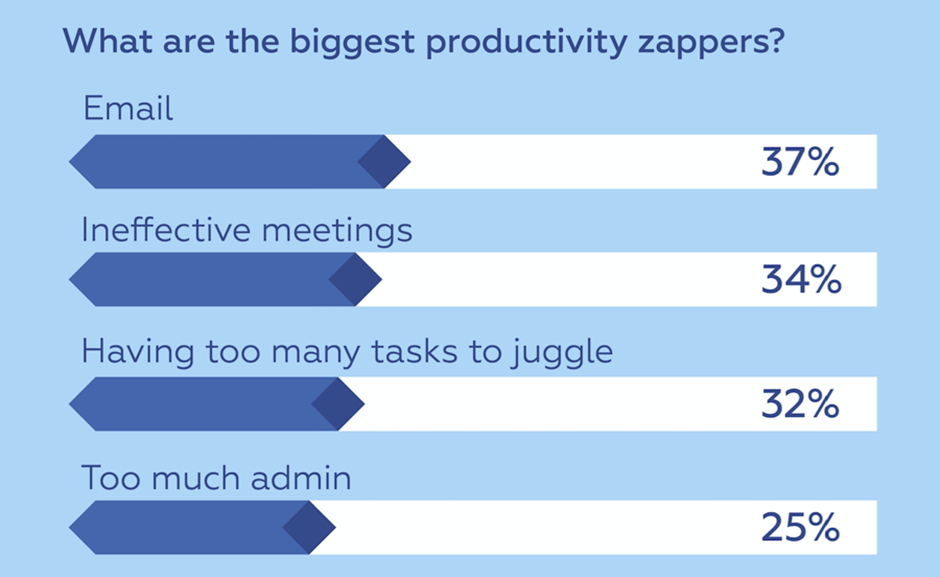Enhance Productivity in the UK Workforce Through Digital Transformation

Digitising the UK workforce to enhance productivity
In the past two years, there has been a significant increase in the usage of IT tools and applications among the UK workforce. Many offices now use multiple desktop software, web applications, and mobile applications to accomplish their daily tasks.
Despite this increase, the adoption and usage of digital tools in the UK are still lagging significantly behind its neighbouring countries, France and Germany.
As a result, the UK may need to consider increasing its use of digital tools to catch up with its neighbours and stay competitive in the modern business landscape.
Recent studies state that although the use of applications in British businesses is on the rise, outdated work practices may be hindering productivity. Shockingly, statistics show that using more applications may also be linked to higher stress levels in almost 70% of employees.
This highlights the need for organisations to pay closer attention to their productivity levels and identify areas for improvement using an operation efficiency formula. The first step in solving this problem is to ‘MEASURE’.
To improve productivity and reduce stress levels, it is crucial for companies to assess their current work practices and identify areas for improvement. By measuring key performance indicators, businesses can identify where productivity is dropping and take steps to address the issue. This could involve implementing new technologies or processes, streamlining workflows, or providing staff with additional training and support. By taking a proactive approach to productivity, companies can improve their bottom line and create a happier, more engaged workforce.
For about 22% of UK workers, applications were said to hinder or be detrimental in helping to perform work tasks.
In the past year, French and German workers have witnessed a significant surge in their productivity levels, with an increase of 53% and 47%, respectively. However, in contrast, the UK workforce has only witnessed a meagre rise of 26%. This productivity gap could be due to the UK’s slow adoption of new digital working methods. The country lags behind other European countries in embracing digital transformation, which might be a contributing factor in impacting productivity levels.
Adopting new digital technologies and innovative working practices is crucial for UK businesses to enhance their productivity levels. Cloud computing, remote collaboration software, and project management tools can significantly improve operational efficiency and support the workforce in achieving more. Integrating these digital practices can streamline workflows, boost communication, foster better collaboration, and engagement, and ultimately lead to increased productivity levels.
The rapidly evolving digital landscape provides an opportunity for businesses to adapt and innovate. Companies that resist change and refuse to adopt new ways of working are likely to fall behind the competition.
It’s time for UK businesses to embrace digital transformation and leverage the benefits of modern technologies to enhance productivity levels and remain competitive. By investing in innovative working methods and tools, businesses can create a more dynamic and engaged workforce, leading to increased profitability and business growth.
Collaboration tools – which make it easier to work on projects together – are only used by 15% in the UK, compared to nearly a quarter in France (24%). Conferencing is used by 17% in the UK, but nearly 28% in Germany.
There is a similar picture for project management software (UK 17%, France 28%, Germany 25%). This will need to be addressed to run optimised operations and not just look at off-shoring as the answer to save costs. This productivity leakage has an answer, Visibility and Real-time Actionable Insights through Workforce Analytics can enable leaders to have better control over their operations and help them make smarter decisions.

In today’s workplace, there is a concerning trend of employees disengaging and resorting to “Quiet Quitting,” where they simply do the bare minimum to get by and leave work on time each day. This lack of motivation can be attributed to the absence of creativity and interest in some industries, which ultimately leads to a demotivated workforce. Unfortunately, this false sense of productivity can lead to larger problems down the line, as leaders believe that everything is running smoothly.
To overcome this challenge, companies need to focus on productivity growth, which is crucial for achieving sustainable economic expansion. One solution that has proven effective is leveraging technology. In fact, technology has been and will continue to be one of the biggest drivers of productivity.
Despite the UK’s slow productivity growth over the past decade, there is hope for improvement in the future. The acceleration of digital transformation has the potential to lead to significant productivity gains in the coming years. While there is no easy fix, companies can start by embracing technology and digital solutions to streamline their operations and improve their overall productivity.
Written By

Harjiv Singh Rekhi
Vice President & Client Partner @ ProHance



